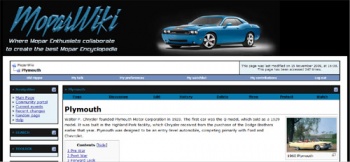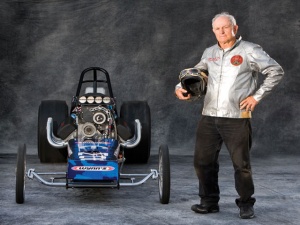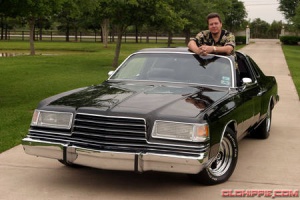Difference between revisions of "Main Page"
| Line 1: | Line 1: | ||
| + | |||
__NOTOC__ | __NOTOC__ | ||
| Line 25: | Line 26: | ||
| '''Featured MoparWiki''' | | '''Featured MoparWiki''' | ||
|} | |} | ||
| − | ; | + | ;Don Garlits |
| − | [[Image: | + | [[Image:Don garlits.jpg|thumb|300px|Big Daddy Don Garlits in his 70s]] |
| + | |||
| + | == Intro == | ||
| + | Donald Glenn Garlits (born January 14, 1932, Tampa, Florida) is considered the father of [[drag racing]]. He is known as "Big Daddy" to drag racing fans around the world. A pioneer, with the help of TC Lemmons, and after he lost a portion of his foot in a drag racing accident, he perfected the design rear-engine "[[top fuel]]" [[dragster]] (notable because it put the most explosive parts of the dragster behind the driver) and was an early endorser of a full-body, fire-resistant suit. In 1964, he became the first drag racer to officially surpass 200 miles per hour; he has broken a number of other speed records, surpassing 270 miles per hour in 1986. | ||
| + | |||
| + | Drag Racing was a California based sport. Don Garlits being from Florida was the outsider who came in and beat them at their own game. He was sometimes referred to as the Floridian, such was his uniqueness. | ||
| + | |||
| + | '''Garlits was the first driver to win three [[National Hot Rod Association]] national titles and three world championships, the last coming at the age of 54.''' | ||
| + | |||
| + | Garlits won the first [[NHRA]] Drag race he entered with the first racecar he built. It was 1955, and the NHRA [[Safety Safari]] had come to Lake City, Fla. A short three years later, the garage and body shop owner was racing professionally with the first of 34 race cars he would later tag [[Swamp Rat]]. He didn't stop until 1992, when eye trouble, the result of deceleration G forces of nearly 7 G’s, forced him from the seat at age 60. In the four-decade interim, Garlits took on all comers on any racetrack in the country and sometimes abroad. Driving chassis he fabricated that were powered by engines he built, Garlits won 144 major open events and 17 national championships in the sport's three major hot rod associations | ||
| + | |||
| + | == Personal Data == | ||
| − | + | *Full Name:Donald Glenn Garlits | |
| + | *Nickname: [[Big Daddy]] | ||
| + | *DOB: 1-14-32 | ||
| + | *Place of Birth: Tampa, Florida | ||
| + | *DOD: | ||
| + | *Place Interned: | ||
| + | *Spouse: His high school sweetheart...Patricia Bieger, which he married a year after she graduated in 1953 | ||
| + | *Children:2 Daughters....Gay Lyn & Donna. | ||
| − | + | Don got married and decided to settle down – until a Sunday drive took them past a drag strip. On a whim, Garlits entered the family sedan, a 1950 Ford. After capturing the class win and a trophy, Garlits knew that drag racing was his future. | |
| − | + | == Childhood == | |
| − | + | Donald Glenn Garlits grew up poor in Tampa, Florida, and honed his mechanical skills repairing bicycles and farm equipment. His future was uncertain until a high school teacher introduced him to a new publication called Hot Rod Magazine. The young Garlits was hooked, and at the age of 17, bought his first car, a blue 1940 Ford sedan, for $345. | |
| − | + | Don got married and decided to settle down – until a Sunday drive took them past a drag strip. On a whim, Garlits entered the family sedan, a 1950 Ford. After capturing the class win and a trophy, Garlits knew that drag racing was his future. | |
| − | + | == Education == | |
| − | + | Don went to Hillsborough High School, Tampa, Fl | |
| − | |||
| − | + | == '''Important Accomplishments''' == | |
| − | + | His first win in 1955 was in his crude and highly modified 12.1-second, 108-mph, flathead-powered '27-T roadster-cum-slingshot: | |
| − | + | Garlits built his first Swamp Rat: Built on '30 Chevy frame rails, he raced that car for five years all over the country and in many incarnations. | |
| − | + | He won the Florida State Championships in 1956, it turned 10.9s at 135 mph | |
| − | + | '''In 1957, he was the first to exceed 170 mph, (176.40); the next year, he was the first over 180, (180.00) mph''' | |
| − | + | By 1961 and with the retirement of Swamp Rat I, the six [[Stromberg carburetors]] had been replaced by a '''[[supercharger]]''', the gasoline by [[nitromethane]], and the e.t.s were in the low eights, (8.36). "Swamp Rat II" | |
| − | [[ | + | By the time he built Swamp Rat III, he had won the [[AHRA]] Nationals, the Texas State Championship in 1958, Then in 1959, he won the Northern California championship, the Arizona State championship. |
| − | + | Then with Art Malone driving while he recovered from near-fatal burns suffered in a match race in Chester, S.C., they won The Riverside Invitational in California. '''In 1960, Don returned to driving, in Swamp Rat II, a gas-powered dragster, he won the first NHRA Winter Nationals in Daytona, Fla.''' | |
| − | + | == Swamp Rats == | |
| − | + | need [[collaboration]] on the [[Swamp Rats]] | |
| − | + | ||
| + | By the close of the 1960s, when NHRA hosted only two national events a year from 1961 to 1965 and four a year from 1965 to 1969, Garlits had won six titles. He had also won four AHRA national events and the first of five U.S. Fuel & Gas Championships in seven career final rounds. Driving two different Swamp Rat dragsters each day of the two-day Fuel & Gas runoffs in 1965, Garlits won Saturday and again Sunday over teammate Marvin Schwartz. The event had been created in 1959 specifically to lure Garlits to California to race. | ||
| − | + | The 1970s opened badly for Garlits when a transmission explosion -- in the fatefully tagged Swamp Rat XIII ... The rear engine dragster was born ... A year later Garlits took his rear-engine Swamp Rat XIV to the final again. Several weeks later, he became the first to win an NHRA national event with a rear-engine dragster when he set the Top Fuel class on a new course by winning the Winternationals | |
| − | + | In the 1970s, driving a succession of Swamp Rat dragsters, Garlits became the first to run in the 6.3s and the first to exceed 250 mph. He ran the first 250-mph speed at the 1975 NHRA World Finals to win his and the first Winston NHRA World Championship; the speed would not be eclipsed for seven years. His e.t. on the run, 5.63, was a tenth and a half quicker than the record he had set two years earlier. | |
| − | + | '''Swamp Rat XXX''', the first successful streamlined Top Fuel dragster, took Garlits to his third Winston Top Fuel championship in 1986. In 1987, he took it and the reputation of the sport to Washington, D.C., for the car's installation at the Smithsonian Institution. | |
| − | |||
| − | |||
| − | |||
| − | |||
| − | |||
| − | |||
| − | |||
| − | |||
| − | |||
| − | |||
| + | He further contributed to the sport in the 1980s when he opened the Don Garlits Museum of Drag Racing in Ocala, Fla., in 1984 | ||
| − | [[ | + | [[Don Garlits|More]] |
| style="width:50%;background:#EBF8FF; border:1px solid #004E7C; color:black;align:center;vertical-align:top" | | | style="width:50%;background:#EBF8FF; border:1px solid #004E7C; color:black;align:center;vertical-align:top" | | ||
Revision as of 14:50, 25 November 2012
|
IntroDonald Glenn Garlits (born January 14, 1932, Tampa, Florida) is considered the father of drag racing. He is known as "Big Daddy" to drag racing fans around the world. A pioneer, with the help of TC Lemmons, and after he lost a portion of his foot in a drag racing accident, he perfected the design rear-engine "top fuel" dragster (notable because it put the most explosive parts of the dragster behind the driver) and was an early endorser of a full-body, fire-resistant suit. In 1964, he became the first drag racer to officially surpass 200 miles per hour; he has broken a number of other speed records, surpassing 270 miles per hour in 1986. Drag Racing was a California based sport. Don Garlits being from Florida was the outsider who came in and beat them at their own game. He was sometimes referred to as the Floridian, such was his uniqueness. Garlits was the first driver to win three National Hot Rod Association national titles and three world championships, the last coming at the age of 54. Garlits won the first NHRA Drag race he entered with the first racecar he built. It was 1955, and the NHRA Safety Safari had come to Lake City, Fla. A short three years later, the garage and body shop owner was racing professionally with the first of 34 race cars he would later tag Swamp Rat. He didn't stop until 1992, when eye trouble, the result of deceleration G forces of nearly 7 G’s, forced him from the seat at age 60. In the four-decade interim, Garlits took on all comers on any racetrack in the country and sometimes abroad. Driving chassis he fabricated that were powered by engines he built, Garlits won 144 major open events and 17 national championships in the sport's three major hot rod associations Personal Data
Don got married and decided to settle down – until a Sunday drive took them past a drag strip. On a whim, Garlits entered the family sedan, a 1950 Ford. After capturing the class win and a trophy, Garlits knew that drag racing was his future. ChildhoodDonald Glenn Garlits grew up poor in Tampa, Florida, and honed his mechanical skills repairing bicycles and farm equipment. His future was uncertain until a high school teacher introduced him to a new publication called Hot Rod Magazine. The young Garlits was hooked, and at the age of 17, bought his first car, a blue 1940 Ford sedan, for $345. Don got married and decided to settle down – until a Sunday drive took them past a drag strip. On a whim, Garlits entered the family sedan, a 1950 Ford. After capturing the class win and a trophy, Garlits knew that drag racing was his future. EducationDon went to Hillsborough High School, Tampa, Fl
Important AccomplishmentsHis first win in 1955 was in his crude and highly modified 12.1-second, 108-mph, flathead-powered '27-T roadster-cum-slingshot: Garlits built his first Swamp Rat: Built on '30 Chevy frame rails, he raced that car for five years all over the country and in many incarnations. He won the Florida State Championships in 1956, it turned 10.9s at 135 mph In 1957, he was the first to exceed 170 mph, (176.40); the next year, he was the first over 180, (180.00) mph By 1961 and with the retirement of Swamp Rat I, the six Stromberg carburetors had been replaced by a supercharger, the gasoline by nitromethane, and the e.t.s were in the low eights, (8.36). "Swamp Rat II" By the time he built Swamp Rat III, he had won the AHRA Nationals, the Texas State Championship in 1958, Then in 1959, he won the Northern California championship, the Arizona State championship. Then with Art Malone driving while he recovered from near-fatal burns suffered in a match race in Chester, S.C., they won The Riverside Invitational in California. In 1960, Don returned to driving, in Swamp Rat II, a gas-powered dragster, he won the first NHRA Winter Nationals in Daytona, Fla. Swamp Ratsneed collaboration on the Swamp Rats
The 1970s opened badly for Garlits when a transmission explosion -- in the fatefully tagged Swamp Rat XIII ... The rear engine dragster was born ... A year later Garlits took his rear-engine Swamp Rat XIV to the final again. Several weeks later, he became the first to win an NHRA national event with a rear-engine dragster when he set the Top Fuel class on a new course by winning the Winternationals In the 1970s, driving a succession of Swamp Rat dragsters, Garlits became the first to run in the 6.3s and the first to exceed 250 mph. He ran the first 250-mph speed at the 1975 NHRA World Finals to win his and the first Winston NHRA World Championship; the speed would not be eclipsed for seven years. His e.t. on the run, 5.63, was a tenth and a half quicker than the record he had set two years earlier. Swamp Rat XXX, the first successful streamlined Top Fuel dragster, took Garlits to his third Winston Top Fuel championship in 1986. In 1987, he took it and the reputation of the sport to Washington, D.C., for the car's installation at the Smithsonian Institution. He further contributed to the sport in the 1980s when he opened the Don Garlits Museum of Drag Racing in Ocala, Fla., in 1984 More |
BK (short for Big Kahuna -- a name friends gave him back in the early 90s) is the Administrator of MoparStyle, which he started in 2001. He's a semi-retired business executive/owner who now spends with his family, drag racing, and maintaining a slew of web sites and a gaggle of collector cars. Childhood Eldest of five boys and three girls who grew up in poverty living in a 2 bedroom apartment. Born in Michigan, but moved to Texas in 1961. Moved again to New Jersey in 1966, New York in 1970, and back to Texas after completion of Military service. Grew up with very little supervision, as his family was so large. His father always worked three minimum wage jobs concurrently, and his mother was too overwhelmed to keep up with all of the kids by herself -- so Dave pretty much grew up on the streets -- getting into a lot of trouble with the law as a kid. He always had a job of some type as a kid, from paper routes to washing dishes. Education He was a D/F student until leaving high school by mutual agreement at 16. Later attended various colleges in the evenings under the GI Bill, with a focus on business and computer science Military Service Dave enlisted in the USAF in 1972, shortly after turning 17, and was the youngest to be serving at the time he arrived to Basic Training in San Antonio, Texas. He spent three years active duty driving trucks, and exchanged his last year active for two years Active Reserves (under Palace Chase) to teach others to drive trucks. Dave spent the next ten years attending college in the evenings under the GI Bill. He is a service connected Vietnam Era disabled Veteran. Employment Career After he completed his military service, he (in order) drove taxi, Tractor-trailer, and dump truck; laid blacktop, roofed, and repo'd vacuum cleaners; was a bill collector, a carpet cleaning salesman, and a draftsman; a postage equipment repairman, a mailroom equipment salesman, and a computer repairman; a computer salesman, Executive VP of two large collection agencies, and owned a collections agency; owned a distress debt buying business, a software company, and a web hosting company; owned an race engine building company, and he now designs web sites. Dave and his eldest son (Dallas) recently started a Motorcycle Tour business by the name of Texas Motorcycle Excursions. Favorite Quote A democracy cannot exist as a permanent form of government. It can only exist until the voters discover that they can vote themselves largesse from the public treasury. From that moment on, the majority always votes for the candidates promising the most benefits from the public treasury with the result that a democracy always collapses over loose fiscal policy, always followed by a dictatorship. The average age of the world's greatest civilizations has been 200 years. Great nations rise and fall. The people go from bondage to spiritual truth, to great courage, from courage to liberty, from liberty to abundance, from abundance to selfishness, from selfishness to complacency, from complacency to apathy, from apathy to dependence, from dependence back again to bondage. Favorite Mopar
Favorite Movie
Favorite Book
Favorite Recent TV Series
Favorite TV Show as a kid
Favorite Song
Favorite Singer
Favorite Band
Favorite Album
Favorite Sports Team
Favorite Charity
Favorite President
Least Favorite President I'd like to party hard all night with
Biggest Babe Ever
More |
|
|
|
|
|
|
|


